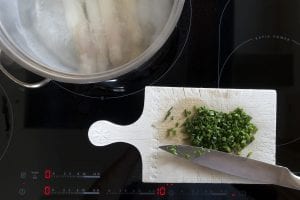
Using your kitchen appliances safely & other household appliance safety tips
Posted by Ship It Appliances Ltd on 25th Sep 2018
How Safe Are Induction Hobs?
Induction hobs use a magnetic field to trigger small electrical currents in magnetic cookware, which causes the cookware to heat up. The induction field is generated via a coil that is located under a thick glass plate in the hob. The hob itself does not get hot, except when it’s in contact with the pan. This means there’s no wasted heat. If you leave the hob on, but don’t put a pan on it, the hob simply won’t heat up.
Because the hob needs to have a pan on it to heat up, it’s a lot safer than a standard electric hob, and unlike gas hobs there’s no risk of fire or of an unlit hob pumping gas into the room. This makes induction hobs one of the safest methods of cooking.
Induction Hobs are (Relatively) Cool to the Touch
The hob itself doesn’t generate any heat – it generates a magnetic field instead. If you don’t put an induction-ready pan on the hob, the hob won’t heat up. That means it should be cool to the touch.
However, the pan will get hot when it is on top of the hob, and some heat will be transferred to the hob’s glass. This is simply because glass gets hot if it is in contact with something that is hot, but even so, the hob will be far cooler than a gas or electric equivalent.
You can touch the surface of an induction hob without burning yourself, but if there has been a pan on there for a while it will have warmed up a little due to heat transfer from the pan. Consequently it’s best to try not to touch it, just in case it’s warmer than you expect.
Induction Hobs Switch Off Automatically if Pans Are Removed
When you remove a pan from an induction hob, it stops heating. This is a really useful feature, because it saves energy and means the hob cools down immediately.
Induction hobs are also a boon for the elderly, for the same reasons. If someone forgets to turn off their hob after they have finished cooking, it won’t be a fire hazard and it won’t run up a huge bill either.
Do Induction Hobs Emit Radiation?
Whenever new technologies emerge, people are naturally wary. We were nervous that microwaves would produce ‘radioactive’ food, and now people are asking the same questions about induction hobs.
Induction hobs do actually emit a form of electromagnetic field – which is technically a form of radiation – however, anything that ‘radiates’ from something is a form of radiation. Mobile phones emit microwaves. Heat, and even light, is a form of radiation. The radiation that induction hobs emit is nothing to be concerned about. Induction hobs emit a form of electromagnetic field that has been extensively tested. According to a report published by the European Commission Directorate-General of Health, as a part of the Consumer Protection’s Scientific Committee on Toxicity, Ecotoxicity and the Environment, discussing EMF and RF energy, induction cooking is safe.
How to stay on top of faulty kitchen appliances
Did you know that nearly 400 fires in London have been caused by faulty kitchen appliances over the past five years? That’s why it’s important to stay current with safety updates and recalls to ensure that your home remains safe and secure.
The Register My Appliance service from the Association of Manufacturers of Domestic Appliances helps you stay up-to-date with any potential safety issues that could be affecting your appliances. The site offers up links to the registration page of most kitchen appliance brands that are sold in the UK. As such, you can quickly and easily access the online forms required to register
The product information you will need to register each new appliance is:
- Brand name
- Model
- Serial number
- Purchase date
“It is so important that we make sure that we register new appliances and don’t risk missing out on key information that could save lives,” says Jo Swinson Consumer Affairs Minister. “This initiative will make it easier for consumers to register appliances both new and old, and will help to ensure that relevant owners get vital information on product recalls and safety notices.”
While kitchen appliances are built to a high standard in order to meet modern safety requirements, there is always a small risk that a fault could start a fire or damage your property in some way. To reduce the odds of this occurring, it is important to stay up-to-date with any potential recalls or safety notices.
What Does The Fire Service Say About Kitchen Safety?
Buckinghamshire Fire & Rescue Service has noticed the unfortunate trend of kitchen fires in in the UK. To help prevent more of these fires from taking place across the country, the brigade has offered up some helpful safety tips.
Hobs tend to be the most common cause of kitchen fires. From leaving a hot pan unattended to having loose clothes catch fire, there are many different kinds of accidents that can occur in the kitchen leading to a blaze.
Prevent Hob Fires By:
- Ensuring that food is dry before you place it in a pan of hot oil to prevent splashing
- Keeping the fryer less than one-third full of oil
- Ensuring that your hob is always attended; if you need to leave the room, take the pan off the heat
- Never try to cook while under the influence of drugs or alcohol
- Keeping the surface of your grill clean
- Avoid storing items on the hob’s surface while it is not in use
- Be extra cautious when wearing loose clothing while cooking
- Keep any flammable items away from the hob
- Always ensure that you turn off the hob when you are finished cooking
If a Pan On Your Hob Catches Fire:
- Do not try to move the pan
- Throwing water over the fire will spread the fire and can lead to serious injuries
- Call 999; do not try to put the fire out yourself.
- Turn of the heat at the mains isolator
- Leave your home and stay outside.
For more helpful information, you can view the brigade’s Fire Safety poster.
What else can you do to keep household appliances safe
Turn off appliances when you’re not home
It may be tempting to put on a load of washing or leave your dishwasher running when you’re at work – but, it can be a serious safety hazard. If you want to save time while doing chores, leave the washers running while you cook or carry out other chores around the house.
“Running a washing machine, tumble dryer or dishwasher overnight or while you are out is a fire risk because of their high wattage, friction and motors,” says Steve Davies, head of the Community Safety for Mid and West Wales Fire and Rescue Service.
Clean lint from your tumble dryer regularly
Be sure to clean the lint filter in your tumble dryer after every use. A build-up of lint can lead to a fire, so it is important not to neglect this task. If you can’t remember the last time you cleaned your lint filter, then it is certainly time to give it a scrub.
Clean your cooking appliances frequently
In the same way that a build-up of lint can cause a fire in your tumble dryer, the accumulation of grease in your oven, grill or hob is also a fire risk. While these do not need to be cleaned out after every use, it is wise to schedule their cleanings at least twice a month – possibly more often, depending on how much you cook.
Double-check your appliances for loose or exposed wires
Faulty wiring is a very dangerous fire risk in your kitchen, so you should check on your wiring several times a year. Ensure that your wires are not damaged in anyway and be sure to inspect them closely. Do not run electrical leads underneath carpets or flooring, as this prevents you from noticing damage. Also, be sure to keep any wiring and plug sockets at least 30cm away from the sink.

